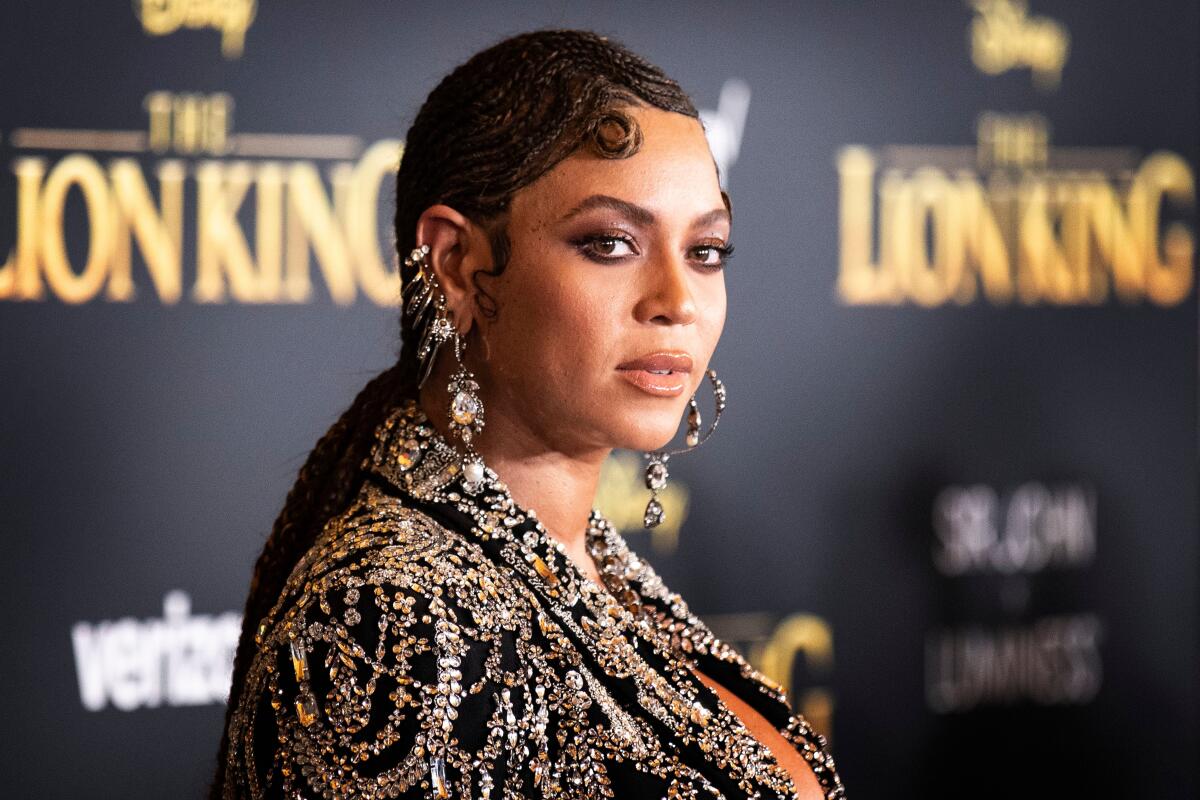Beyonce’s musical genius propels ambitious ‘The Lion King: The Gift’ soundtrack

- Share via
No one takes possession of a cultural space like Beyoncé.
We saw it happen in 2016 when she easily outshone Coldplay during its own Super Bowl halftime performance. We saw it happen last year when she remade the world’s most prestigious music festival as Beychella.
Now we’re seeing it again with Disney’s new version of “The Lion King,” in which the singer voices the role of Nala — and for which she assembled an ambitious companion album that says more than the movie does about family and tradition and responsibility and Africa.
Released Friday, just as the coolly reviewed film hit theaters, “The Lion King: The Gift” features new songs by Beyoncé along with a handful of other hip-hop and R&B acts, including her husband, Jay-Z; her “Lion King” costar Donald Glover (in his Childish Gambino guise); and Kendrick Lamar, whose 2018 “Black Panther” album was clearly a model for this one.
Indeed, like Lamar’s disc, “The Gift” also showcases singers, rappers and producers from a number of African countries — some, such as Burna Boy and Wizkid, with established American followings and others for whom Beyoncé’s imprimatur, and Disney’s promotional might, are sure to provide a foothold here.
Snippets of dialogue between tracks tie the music loosely to “The Lion King’s” durable tale of young Simba’s effort to live up to the example set by his late father, Mufasa. As always, though, the real story Beyoncé is telling is her own.
In the bubbling “Find Your Way Back,” a sequel of sorts to “Daddy Lessons” from 2016’s “Lemonade,” she ponders her complicated relationship with her father and former manager, Mathew Knowles. The hymn-like “Bigger” touches on the ideas of legacy and cultural ownership that ran through “Everything Is Love,” the recent duo album Beyoncé and Jay-Z released as the Carters. The stars’ 7-year-old daughter, Blue Ivy, appears on “Brown Skin Girl,” a tender and cheerful tune about how “the same skin that was broken be the same skin taking over.”

Then there’s the swaggering “Mood 4 Eva,” in which Beyoncé and Jay-Z trade playful boasts about their pop domination: He’s “feeling like Prince in ’84, Mike in ’79, Biggie in ’97”; she points out that while she’s “piña colada-ing, you stay Ramada Inn.”
Sonically, “The Gift” uses “The Lion King’s” setting as an opportunity to deepen Beyoncé’s exploration of African music — a fascination you could hear in earlier songs like “Grown Woman” and “Say Yes,” her exuberant 2014 single with Michelle Williams and Kelly Rowland of Destiny’s Child that repurposed a popular Nigerian gospel tune.
Sometimes the sounds are secondhand, as in “Mood 4 Eva,” which rides a sample of an old song by the Malian singer Oumou Sangaré. But more often Beyoncé is creating new material with young artists from the sprawling set of styles known collectively as Afrobeats. The gently propulsive “Water” pairs her and Pharrell Williams with Salatiel, a singer from Cameroon, while “Already” features the Ghanaian dancehall star Shatta Wale; Lagos-born Wizkid, familiar to Drake fans from his appearance on the smash “One Dance,” lends his imploring vocals to “Brown Skin Girl.”
For several tracks, Beyoncé actually steps aside, as in “Keys to the Kingdom,” a sweetly shuffling tune by Tiwa Savage and Mr. Eazi, and Burna Boy’s silky “Ja Ara E,” in which that Nigerian singer channels Mufasa warning Simba to “watch out for them hyenas.” (Another echo arrives in the song’s smooth saxophone licks, which happily recall Sade.)
Yet even when she’s not heard directly, Beyoncé, who co-produced each track on “The Gift,” can be felt in the meticulousness of the arrangements. For all the natural force of her singing — best displayed here in “Otherside,” a stripped-down piano ballad, and the grand Oscar-bait closer, “Spirit” — Beyoncé puts more thought into her records than anybody else in music, and what’s on her mind now isn’t just where all these sounds came from but how useful they remain.
You can understand “The Gift’s” African focus as part of the branded “Lion King” universe. And after Lamar’s “Black Panther” you can understand this album as evidence of Disney’s determination to attract additional members of the black creative vanguard. But for Beyoncé it also signals her excitement about a moment when pop feels as globalized as it ever has.
More to Read
The biggest entertainment stories
Get our big stories about Hollywood, film, television, music, arts, culture and more right in your inbox as soon as they publish.
You may occasionally receive promotional content from the Los Angeles Times.











